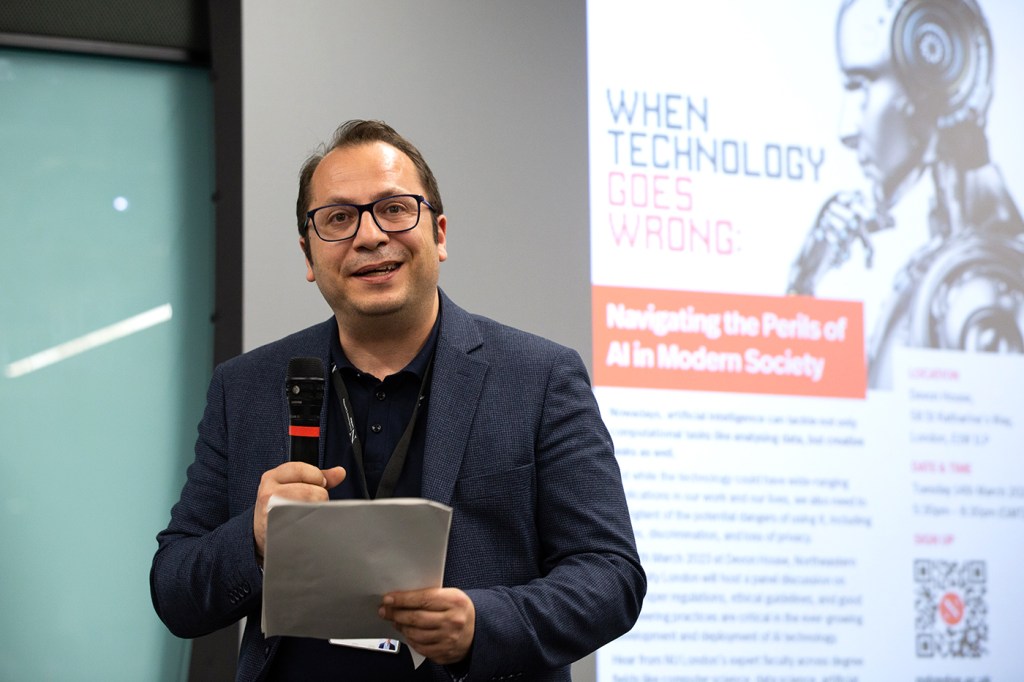Northeastern computer scientist and new Turing fellow looks to ‘rethink’ how we teach programming in the age of AI
Alexandros Koliousis has been made a fellow at The Alan Turing Institute in recognition of his contribution to the education of computer and data science.

LONDON — Alan Turing played a crucial role in speeding up the Allied Forces’ ability to crack the secret messages sent via the Enigma machine used by the Nazis, a development that aided victory over facism during World War II.
The British mathematician — who died tragically young in 1954 and was played by actor Benedict Cumberbatch in the 2014 film “The Imitation Game” — is considered the father of theoretical computer science.
Alexandros Koliousis, the faculty director of Computing, Mathematics, Engineering and Natural Sciences at Northeastern University in London, is an associate professor of computer science who is following in Turing’s pioneering footsteps.
Koliousis was recently made a fellow at The Alan Turing Institute — a U.K. body set up in 2015 to help oversee developments in data science and artificial intelligence — in recognition of his contributions to education.
Professor Mark Girolami, chief scientist at the institute, said Koliousis’ two-year fellowship, which has been bestowed upon him and 50 of his peers, was a mark of his status within the “next generation of world-leading researchers in the data sciences, AI and related fields.”
The institute said the fellows will take part in its “interdisciplinary and collaborative research community” while also supporting work in the areas of skills and public engagement.
The unfunded honorary position will grant Koliousis access to a vast network of peers and resources as he looks to develop the computer science and data science offering at Northeastern.
Featured Posts
Koliousis, who has private sector experience having previously been employed at semiconductor company Graphcore, says he was awarded the fellowship after working to bring something different to the university. “There is not a recipe that you can repeat since the ’70s — things are changing,” he says. “So the question I asked myself was, ‘What new can I bring here?’”
The Greek researcher says he had a “blank canvas” when he started at the university’s London campus in 2020, with support coming from the Khoury College of Computer Sciences to create something unique.
“For me, this fellowship is the culmination of a lot of work, a lot of help from many colleagues and, for me, it is about giving back to the university,” he says. “There are very smart people at the institute — a lot smarter than me — and I want to get a steer from the best people, finding out what they do, what is the latest. That is going to be helpful for us.”
Koliousis wants to use his fellowship to form collaborations and help the next generation “fall in love” with computer science in a world where artificial intelligence is becoming more advanced by the day.
“My personal part in this is to help students to actually understand and fall in love with the concept of computer design and computer software design,” he says. “To actually fall in love with the idea that they can build all the systems that we are talking about. It is about putting all these things together and designing in a particular way. It is the beginning of a journey.”
He feels higher education needs a “rethink” in an environment where AI is likely to be seen as an easy fix for the programmers of the future. Koliousis says that while installing that innate love of creating something, he does not want to prohibit the use of AI. To do so would fail to recognize the changing landscape, he argues.
He recalls how traditionally the first simple task students undertake when learning a program language is to be taught how to make the computer produce the phrase “Hello, World!” on screen. In a world where AI is becoming more prevalent, he is not sure that still stacks up as a useful learning exercise.
“Now, how can you convince them,” he asks, “that this should be their first program to learn when they can say, ‘Wait a minute — I can have my computer speak to me now, I can have proper conversations with my computer’?”
Instead, the focus should be on “demystifying” how artificial intelligence works while “making it a useful tool,” he argues. “The worst thing that you can say now to the student is, ‘Alright, the use of AI is prohibited in this course,’” Koliousis says.
“On our phones, we have many forms of AI — and similarly on our computers. Microsoft’s new operating system that they announced is based on ChaptGPT essentially. So how are you going to say that when the student comes in with a computer where this thing is now integral as part of the software that comes with it?
“Apple is collaborating with Open AI, so once again you have ChatGPT as part of your operational environment. So how can you tell a student ‘Shut everything down’?
“We have to rethink these things really carefully. It is not as easy as providing some kind of policy document of dos and don’ts. It is about making these tools part of our teaching workflow, part of our teaching ethos, the way we approach education.”










